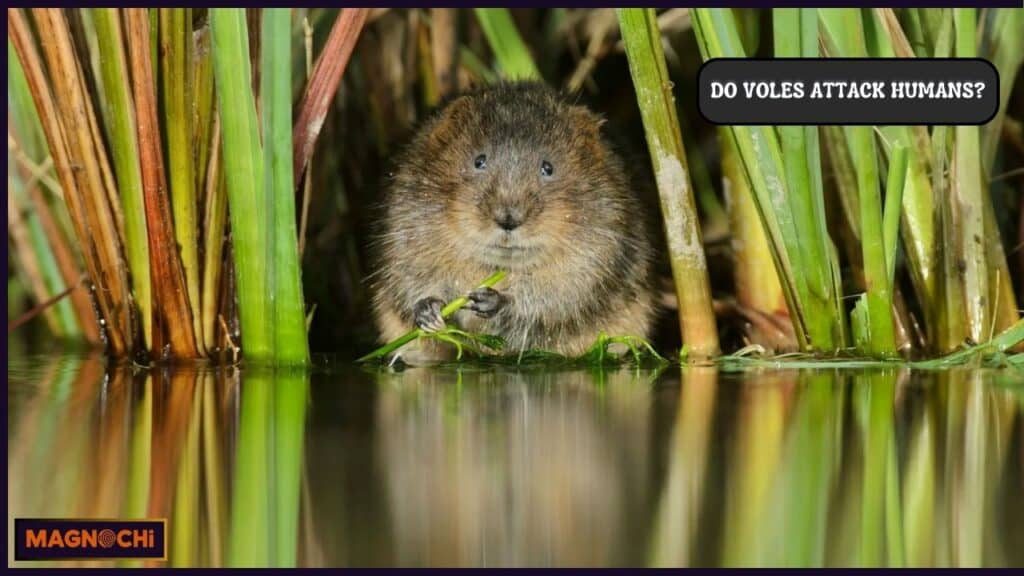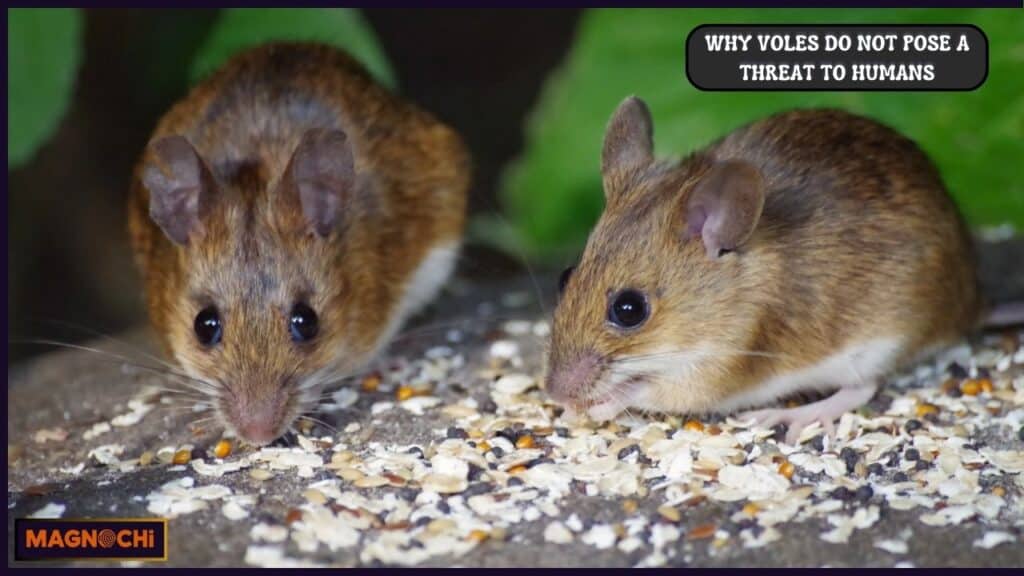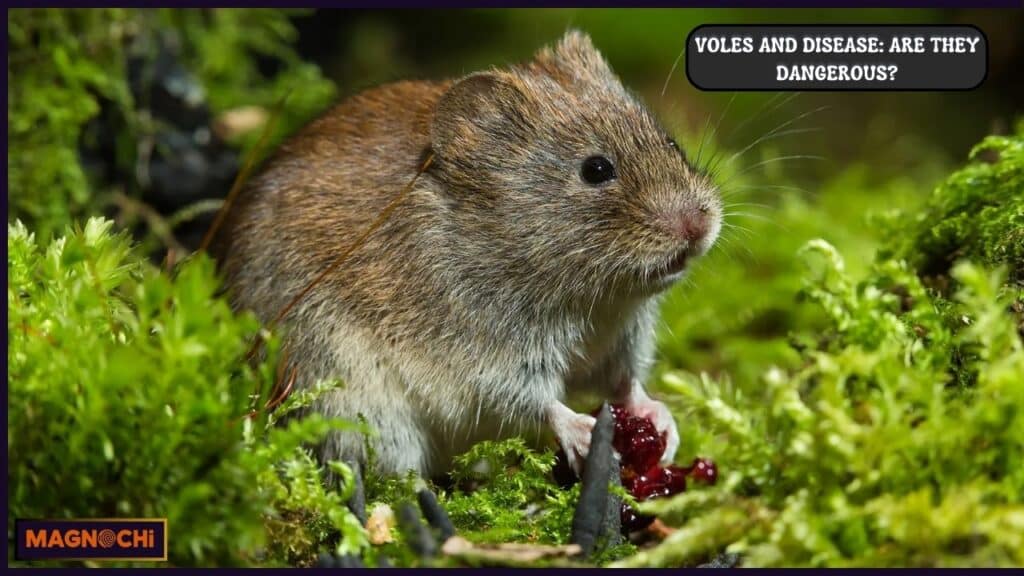Do Voles Attack Humans? Voles often mistaken for field mice or other rodents are small creatures that thrive in various environments, from lush meadows to wooded areas and even our own backyards.
Despite their modest size and timid nature, these creatures often garner fear or curiosity, leading many to wonder: Do voles attack humans?
In this comprehensive guide, we will debunk myths surrounding these misunderstood rodents and provide clear, in-depth insights into vole behavior, potential risks, and how they interact with humans.
If you’ve ever been worried about these small critters in your garden or yard, keep reading. We’ll clarify what you truly need to know about voles and human safety.
What Are Voles?
Understanding Voles: The Small, Shy Rodents
Voles are small rodents belonging to the family Cricetidae, a diverse group of mammals that also includes hamsters, lemmings, and other similar species.
Though they resemble field mice, voles differ in several key ways, including their behavior, physical traits, and ecological roles.
Voles are commonly referred to as field mice, but they are not technically the same. Unlike the more familiar house mouse, which is known for its opportunistic nature and close association with human environments, voles are typically found in fields, meadows, woodlands, and other natural habitats.
They play a vital role in their ecosystems, serving as prey for many predators, including hawks, owls, snakes, and foxes.
Physical Characteristics
Voles are small but sturdy rodents. Here’s a breakdown of their physical characteristics:
- Size: Adult voles typically measure between 4 to 8 inches in length, including their tail. Their small size and robust body make them well-adapted to their environment.
- Appearance: Voles have a compact body with short, stocky limbs, small, rounded ears, and a blunt snout. Their eyes are small and dark, and they have sharp incisors that they use to gnaw on plants and roots.
- Fur Color: The fur of a vole can vary, but it is often brown, gray, or reddish in color, helping them to blend into their natural surroundings. Their fur is dense, which helps protect them from the elements.
Voles are equipped for survival, with adaptations such as sharp teeth for gnawing and burrowing capabilities. However, despite their toughness, voles are far from aggressive creatures.
Let’s dive into their behavior and interactions with humans.

Do Voles Attack Humans?
Vole Aggression: Separating Fact from Fiction
The idea of voles attacking humans is largely a myth. While it’s true that these small rodents can sometimes be found in our gardens or backyards, the reality is that voles are shy creatures with a very specific set of instincts designed to avoid conflict.
Voles are not aggressive by nature. They are prey animals, which means that their survival instincts prioritize fleeing from danger rather than confronting it. [Do Voles Attack Humans?]
Their behavior is driven by the need to find food, shelter, and safety not by aggression. If a vole comes into contact with a human, it will most likely try to escape rather than engage.
When Do Voles Bite?
The rare occasions when voles may bite humans occur only under specific conditions. For instance:
- If they feel trapped or cornered: Voles do not have the physical capability to overpower a human. However, if they feel they have no way out, they may attempt to bite in self-defense. This could happen if you try to handle or catch a vole.
- If handled improperly: If you try to pick up or hold a vole without proper care, it may bite as a natural reaction to fear. However, this is uncommon and only occurs when the vole feels directly threatened.
In most instances, vole bites are minor and do not cause serious injury. A vole’s teeth are designed for gnawing on plants, not for inflicting harm on humans. A bite may cause some discomfort, but it is rarely dangerous.
Vole Behavior: Timid and Shy Creatures
Why Voles Avoid Humans
Voles are instinctively shy and avoid confrontation. These small creatures have evolved to be prey for a variety of predators, including birds of prey, carnivorous mammals, and snakes. Because of this, their primary behavior is focused on survival.
In the wild, voles are constantly on the lookout for predators and will take any opportunity to flee from potential threats. [Do Voles Attack Humans?]
When humans are encountered, voles will typically avoid direct contact.
They are more likely to retreat to their burrows or other hiding spots than to approach or interact with humans. This behavior is rooted in their survival instincts, not any desire to interact with humans.
How Voles Interact with Other Animals
In nature, voles are an important food source for many animals. They are considered prey animals, and their primary interactions are with predators, not with other rodents or humans.
Voles play a crucial role in the ecosystem by serving as a food source for various birds and mammals. This predator-prey dynamic helps maintain balance within the ecosystem.
Territorial Behavior
Although voles are timid creatures, they can display territorial behavior, especially when it comes to their burrow systems. These rodents establish burrow networks where they sleep, store food, and raise young.
These burrows are usually underground but may have multiple entry points and pathways.
When another vole or animal encroaches on their territory, voles may become more assertive and defensive, but this is typically only when their territory or nest is directly threatened.
The response is usually not aggression; instead, they may try to flee or hide.

Why Voles Do Not Pose a Threat to Humans
Despite their reputation as pests, voles are not dangerous to humans. Their behavior is primarily focused on survival rather than confrontation. Let’s break down why voles do not pose a threat:
Voles Are Small and Physically Harmless
Voles are small rodents, typically weighing between 1 and 3 ounces. Their small size means they are unable to cause significant harm to humans. Even if a vole were to bite, the wound would be minor and unlikely to lead to any lasting injury.
Timid Nature
Voles have evolved to avoid contact with larger animals, including humans. As prey animals, they instinctively seek to stay hidden and will flee from danger rather than confront it.
They are non-aggressive animals, and their primary concern is finding food and shelter, not fighting or attacking. [Do Voles Attack Humans?]
No Intent to Attack
Voles do not actively seek out humans or pose a direct threat to us. Their behavior is centered around avoiding danger. In their natural habitats, voles tend to stay hidden and are rarely seen by humans unless they are disturbed.
Are Vole Bites Possible?
The Truth About Vole Bites
Though it is very rare for a vole to bite, it is possible if the rodent feels threatened. In situations where a vole is handled or cornered, it may bite as a means of self-defense. However, these instances are very uncommon, and the bites are typically minor.
Symptoms of a Vole Bite
If you are bitten by a vole, the wound may be small and superficial. It might cause some pain or discomfort, but it is unlikely to result in a serious injury. In most cases, the bite will heal quickly and without the need for medical intervention.
However, it is always advisable to clean any wound thoroughly to prevent infection.
When to Seek Medical Attention
In very rare cases, if the bite becomes infected or shows signs of severe pain, swelling, or redness, it’s important to seek medical attention. It is also wise to monitor for any unusual symptoms that could indicate a potential infection.
What to Do if You Encounter a Vole
Stay Calm and Let the Vole Escape
The best course of action if you encounter a vole is to stay calm. These creatures are easily frightened, and making sudden movements could cause unnecessary stress.
The vole will likely try to escape on its own, either by running into nearby vegetation or retreating into its burrow. Simply allow it to do so. [Do Voles Attack Humans?]
If you find a vole in your yard or garden, it’s important not to panic. Voles typically do not present any danger to humans, and they will avoid human interaction whenever possible.
Humane Traps for Vole Removal
If voles have become a nuisance in your garden or home, you may want to consider humane traps. These traps capture voles without harming them, allowing you to release them safely away from your property. When using traps, be sure to:
- Set them in areas where voles are active (e.g., near burrow entrances).
- Check the traps frequently to minimize stress for the vole.
- Release the vole at a reasonable distance from your home to prevent it from returning.

Voles and Disease: Are They Dangerous?
Although voles are generally harmless, they can carry certain diseases that may pose a health risk to humans. However, the likelihood of contracting these diseases through casual interaction with a vole is low.
Diseases Transmitted by Voles
Voles can carry various parasites and pathogens that might be transmitted indirectly. Some of the most notable diseases associated with voles include:
- Hantavirus: A viral infection that can be contracted through contact with rodent urine, feces, or saliva. This virus can cause respiratory distress and is a serious concern if inhaled or ingested.
- Leptospirosis: A bacterial infection transmitted through contact with water or soil contaminated with rodent urine. It can lead to flu-like symptoms, including fever and muscle aches.
- Tularemia: A bacterial infection that can be transmitted through direct contact with infected voles or their carcasses.
Ticks and Lyme Disease
Voles are known to carry ticks, which are responsible for transmitting Lyme disease and other illnesses. [Do Voles Attack Humans?]
While voles themselves do not directly transmit Lyme disease, the ticks they carry can spread the bacteria to humans.
To avoid Lyme disease, take precautions when venturing into areas where voles may live, such as wearing long sleeves and pants and using insect repellent.
Hygiene Precautions
To reduce the risk of contracting diseases from voles, follow these simple hygiene precautions:
- Avoid direct contact with vole droppings, urine, or saliva.
- Wear gloves when handling anything that may have been exposed to vole waste.
- Wash your hands thoroughly with soap and water after handling objects that may have come into contact with voles.
FAQs
Are Voles Aggressive Towards Pets?
Voles are not aggressive towards pets. They typically try to avoid contact with any larger animals, including cats and dogs. However, if a pet corners a vole, the animal may attempt to defend itself by biting. This is a rare occurrence.
Can Voles Bite?
Yes, voles can bite if they feel threatened. However, bites are rare and usually occur only when the vole is directly handled or trapped.
How Do Voles Interact with Other Animals?
Voles are prey animals and have very little interaction with other animals, aside from those that might prey on them. They are an essential food source for many predators in their ecosystems.
Are Voles Dangerous to Crops or Gardens?
Voles can be a nuisance to gardeners, as they often gnaw on plant roots and bulbs. However, they are not typically destructive enough to cause severe damage to crops or gardens.
How Do I Keep Voles Out of My Yard?
To discourage voles from entering your yard, keep it tidy and free of excess vegetation. You can also use natural repellents, such as castor oil-based sprays, and make sure there are no easy burrow openings near your home or garden.
Conclusion: Do Voles Attack Humans?
The answer is clear: Voles do not attack humans. These small, shy rodents avoid human contact whenever possible.
While it is possible for a vole to bite in rare instances typically when it feels cornered or threatened these bites are generally harmless and do not pose any serious threat to human health.
By understanding the behavior of voles and recognizing the risks (which are minimal), we can coexist peacefully with these creatures in our yards and gardens.
Voles are not aggressive and do not actively seek human interaction. Instead, they prefer to remain hidden and avoid conflict. [Do Voles Attack Humans?]









